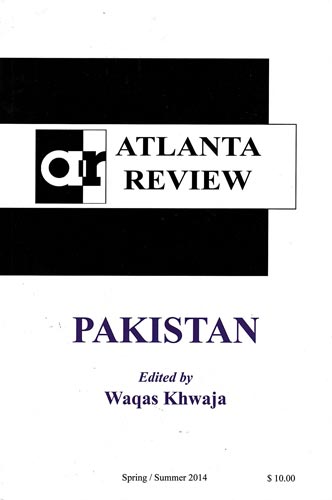Atlanta Review – Spring/Summer 2014
An out-of-this-country experience, the Atlanta Review introduces a collection of poems that touches on issues of race and bias. In this issue, readers are taken on a tour of Pakistan as they discover a unity in life’s tragedies.
An out-of-this-country experience, the Atlanta Review introduces a collection of poems that touches on issues of race and bias. In this issue, readers are taken on a tour of Pakistan as they discover a unity in life’s tragedies.
The journal opens with a “Welcome” section that introduces this issue, looking at specific poems that the reader will soon get to read: “from ghazals of passionate love to (equally passionate) present-day politics.” There’s also an “Introduction” page to Pakistan, which transitions into the “themes of loneliness and separation from the beloved” and “evolved [poems] from its romantic and mystical import and implication to acquire a political and social resonance.”
An all-poetry journal, the variety in form keeps the reading interesting. My favorite poem is “Jest Lookin’” by Nancy M. Boyken. It’s a prose piece that stands out from the others because of its narrative sarcastic humor. The poem starts off with a quote or message for a dating website where a mother explains, “I am looking for a meaningful relationship with a partner with whom I can share all the beauty, wonder and excitement of life.” It’s a list of what she’s looking for, while describing the type of person she is. I love the line, “I especially like my baseball bat for solving issues and differences of opinion.” The humor breaks up the other sad tones within the collection. In this issue of Atlanta Review, it’s nice to read a narrative prose poem, which is different from the other stanzaic forms.
Waqas Khwaja translated a lot of the poems in the Pakistan section, including “We Shall See” by Faiz Ahmad Faiz, which expresses the revolution of getting rid of British influence. In the line, “All thrones brought to dust,” the British weren’t specifically mentioned, but readers can connect it with what they learned about Pakistan’s history in the “Introduction” page to create a deeper connection to the international experiences in the poems. Another translation by Khwaja is “I asked the night” by Javed Shaheen. This poem contains more of a violent turn for the collection. The images become darker in the lines “The slaughter of so many dreams / and not a clue! / So many bodies disposed in the river / and the water not discolored!”
Atlanta Review does a great job letting the poems speak to one another. For example, in “Poem” by Hassan Dars and “This Face This” by Soniah Kamal, the writers express this idea of mistaken identity and the fear behind being considered different. It’s nice to see multiple poems by one author, but there are so many on one page (as poems by the same author are placed below one another), I feel the single poem doesn’t get the attention it deserves.
The last section is my favorite, as the poems turn to a natural dreariness with winter and snow. Rachel Hadas in “Blackberries in the Snow” expresses a different portrayal of darkness from the Pakistan section. “Only when darkness is returning do / I ask: what did those berries signify, / or the harsh hill I struggled up through snow?” Reading the last section, it feels as if the collection is coming to a close, creating a softer tone. The collection ends with “Snowflakes on a Hardening Land” by Robert S. King. I love the line “old hopes keep a small fire burning,” which gives a futuristic, hopeful, light ending to some uncomfortable darkness the Pakistan section touches on.
As the editor Dan Veach explains, “Atlanta Review is an international poetry journal devoted to bringing surprise, wonder and delight to readers around the world.” The collection of poems goes from the introduction of loss to more violent concerns, concluding with this image of hope—a wonderful and delightful journey indeed.
[www.atlantareview.com]
Reviewer bio: Laurie Jackson is a graduate from SUNY Oswego, with a B.A. in Creative Writing. She’s currently in the M.A. in Writing program at Coastal Carolina University. She’s working as a graduate teaching assistant in English and is an editorial assistant for the University’s literary magazine, Waccamaw.





